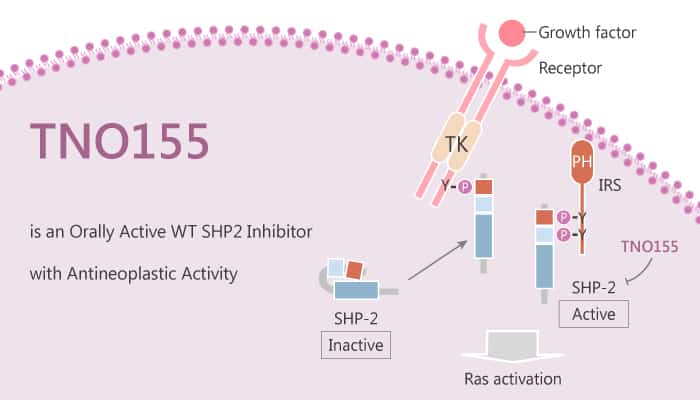SHP2 is a non-receptor ubiquitous protein tyrosine phosphatase and has a relatively conserved structure and function.
The SHP2 includes the PTP domain, two SH2 domains, and a C-terminal tail containing two phosphorylation sites. Binding of the N-SH2 domain with the PTP domain is able to inhibit SHP2 activity. N-SH2 domain binds to the phosphorylation site leading to a conformational change. Then the PTP domain is catalytically activated. The above changes lead to SHP2 activation and tumorigenesis.
SHP2 takes part in cancer cell survival and proliferation. Many cancer cell lines are sensitive to SHP2 depletion, at the same time, it is sensitive to EGFR depletion. Furthermore, SHP2 contributes to the survival of RTK-driven cancer cells.
SHP2 is the receptors of several downstream targets. For example, SHP2 is the downstream molecule of the PD-1 signaling pathway. It not only inhibits T-cell activation but also leads to T-cell energy. As a result, SHP2 inhibitors combine with the PD-1 signaling pathway inhibitor in T cell immunotherapy.
Additionally, SHP2 inhibitors are able to decrease the stemness of KRAS-mutant NSCLC cells and decrease ALDH1 activity or stemness marker expression. this result demonstrates that SHP2 inhibitors can increase the sensitivity of TKIs and chemotherapy for the study KRAS-mutant NSCLC treatment.
Following, we will introduce a novel SHP2 inhibitor, TNO155.

TNO155 combines with KRAS G12C inhibitor exhibits robust potency for advanced solid tumors with harbor KRAS G12C mutations.
TNO155 is a potent selective and orally active allosteric inhibitor of wild-type SHP2 (IC50=0.011 µM). It has the potential for the study of RTK-dependent malignancies, especially advanced solid tumors
TNO155 shows an IC50 of 0.008 µM in the KYSE520 pERK assay. It shows an IC50 of 0.100 µM in the KYSE520 5-day cell proliferation assay. The off-target IC50 values are 18 µM, 6.9 µM, and 11 µM for Cav1.2, VMAT, and SST3, respectively. The oral bioavailability in mouse, rat, and money is 78%, 86%, and 60%, respectively.
In conclusion, TNO155, as a potent SHP2 inhibitor, has the potential for the study of tumors, especially solid tumors.
Reference: